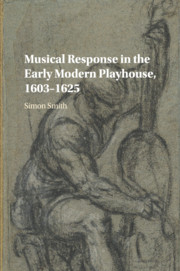Crossref Citations
This Book has been
cited by the following publications. This list is generated based on data provided by Crossref.
McEvilla, Joshua
Sharrett, Elizabeth
Cryar, Jennifer
Ragni, Cristiano
and
Equestri, Alice
2019.
VIII Renaissance Drama: Excluding Shakespeare.
The Year's Work in English Studies,
Vol. 98,
Issue. 1,
p.
445.
Lewis, Sarah
and
Whipday, Emma
2019.
Sounding Offstage Worlds: Experiencing Liminal Space and Time in Macbeth and Othello.
Shakespeare,
Vol. 15,
Issue. 3,
p.
272.
Whipday, Emma
2019.
Shakespeare's Domestic Tragedies.
Smid, Deanna
2019.
Sans Tongue, Sans Hands, Sans Music? Violence and Musical Bodies in Titus Andronicus.
Shakespeare,
Vol. 15,
Issue. 4,
p.
398.
Richardson, Catherine
2019.
“More things in heaven and earth”: Materiality and the Stage.
Shakespeare,
Vol. 15,
Issue. 1,
p.
88.
Phillips, Harriet
2019.
Nostalgia in Print and Performance, 1510–1613.
Barzilai, Reut
2019.
“In My Power”:The Tempestas Shakespeare’s Antitheatrical Vision.
Shakespeare,
Vol. 15,
Issue. 4,
p.
379.
Snaith, Anna
2020.
Sound and Literature.
Hazrat, Florence
2020.
More than “Noise”: Music as Pacemaker inAs You Like It.
Shakespeare,
Vol. 16,
Issue. 2,
p.
188.
Eubanks Winkler, Amanda
2020.
Music, Dance, and Drama in Early Modern English Schools.
Cox Jensen, Oskar
2021.
The Ballad-Singer in Georgian and Victorian London.
Lauenstein, Eva
2022.
“InItalianhand”: melancholy, gender and bibliographical codes in commemorative text.
The Seventeenth Century,
Vol. 37,
Issue. 6,
p.
893.
Smith, Simon
2023.
Approaching Playhouse Song in the Archive: The Case of Dekker, Ford, Middleton, and Rowley’s The Spanish Gypsy.
English Literary Renaissance,
Vol. 53,
Issue. 1,
p.
35.
Whipday, Emma
2023.
Teaching Shakespeare and His Sisters.
Sokolov, Danila
2024.
Unlyric: The Lute-Object in Early Modern English Poetry.
Exemplaria,
Vol. 36,
Issue. 1,
p.
1.





